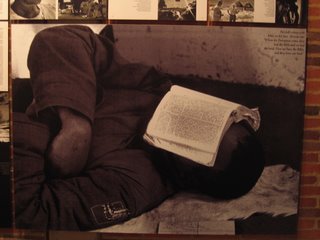The power of religion... Sometimes good, sometimes bad.
 Friday, August 4, 2006 at 7:52PM
Friday, August 4, 2006 at 7:52PM Today I was back at the Apartheid Museum in South Africa with some visitors that are teaching at John Wesley College (from Left to Right are Dr Willie Jennings (Academic Dean of Duke Divinity School, Professor of Theology), the Revd Joanne Brown-Jennings (to whom Willie is married), myself (in my Duke sweat-shirt), and Dr Jane Leach (Director of Pastoral Theology at Wesley House, Cambridge University).

Piet falls asleep with Bible on his face. Africans say: "When the Europeans came, they had the Bible and we had the land. Now we have the Bible and they have our land".
 Makes one think. We have so much to repent of. As I think about it the faith is so often abused to enslave and abuse people (to judge, to exclude, to dissempower, to impoverish). In some ways Christianity has been quite vulnerable to the forces of power and abuse. However, there is something in that vulnerability that makes it so powerful to change. It is a faith that can identify with the powerless and the needy, a faith that can understand what it is to be misunderstood and misrepresented. It is a powerful faith that is born out of weakness.
Makes one think. We have so much to repent of. As I think about it the faith is so often abused to enslave and abuse people (to judge, to exclude, to dissempower, to impoverish). In some ways Christianity has been quite vulnerable to the forces of power and abuse. However, there is something in that vulnerability that makes it so powerful to change. It is a faith that can identify with the powerless and the needy, a faith that can understand what it is to be misunderstood and misrepresented. It is a powerful faith that is born out of weakness.
This is why I love Christ. I am loved not because I am in any way worthy, or because I have status, or because I have power over others. No, I am loved because I am weak, I am fragile, I am open to being abused; and even more so because I am open to the sin of abusing others. I am human, and Christ is humane.
As Gregory of Nazianzus, the Eastern Parent of our faith once wrote against the Apollinarians:
That which is not assumed is not redeemed.
The word 'assumed' is similar to the Greek word used in Ephesians 1:10, the word that Irenaeus used in the formulation of the Doctrine of recapitulation (anakephalaiosis[GR]). It means to take in, to consume, to share in, to incarnate, to enter into...
Athanasius wrote in a similar vein that,
God became human so that we might become God.
(for those who have not YET done Systematic Theology 1, this process is known as 'divinisation' or 'theosis' - and NO, it is not a heresy! God longs for us to become more like God). As we become more deeply committed to God in Christ, through the power of the Holy Spirit, we come to resemble God more fully. But it also means that as God enters into our world (to draw us onto God's self), Christ takes on all of our sin and brokenness. This is a huge risk!
God loves us as much as we need Christ. Isn't that amazing? A vulnerable God, caring for us through a vulnerable faith. I love loving Christ! Even more than that, I love being loved by a loving Christ!



Reader Comments